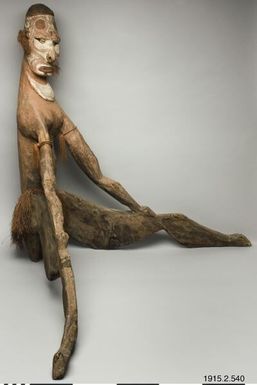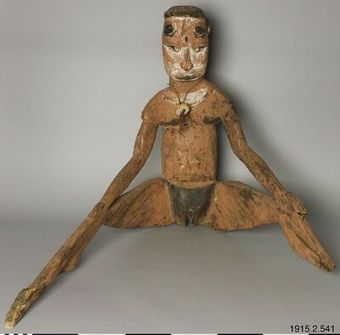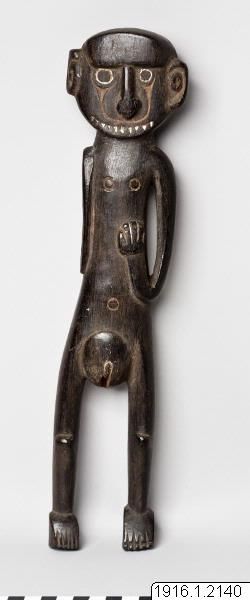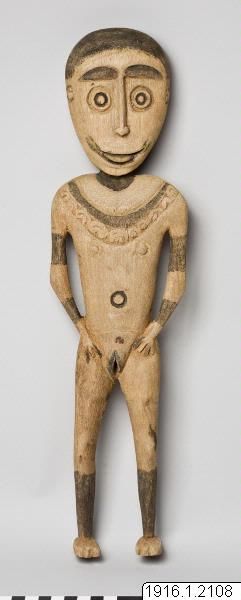kvinnoskulptur, skulptur, female figure, sculpture
- Description:
- The female figure cut out of a piece of wood sitting with white barred legs. The cut so that clear wades and thighs are formed with hands on the knees. Around the waist is a grass crop attached, which is colored in brown and black. Around the arms, the figure has twisted filament bands that are tied together. Around the neck, the figure is decorated with a white crescent-shaped decoration cut in low relief and colored white. The figure has an oval face with a mouth cut in low relief with red lips, large pierced nose with a knotted string of plants in. Even the outlying ears are pierced and the plant fiber cords tied therein. The face is white painted on the face with red curvy lines. In the forehead, circles are painted on either side of the forehead. In the middle of the forehead is a drop-shaped figure painted. Caulians are used as eyes, marked eyebrows. The head ends as in a bud, depicting hair. In the Middle Sepika area and especially in the ceremonial house of Iatmul-men, women’s figures are kept similar to this in the upper house where cultural objects are kept. The figure sits at the top of the ladder that one uses to get upstairs with his face to the interior of the house. Thus, to get upstairs, one must pass through the figure’s barred leg. The figure represents the mythical first woman.
- Location:
- Papua New Guinea
- Format:
- image
- Collections:
- Museum of Ethnography
- Content partner:
- Museum of Ethnography
- Availability:
- Not specified
-
Copyright status: Share, modifyFind out more about what you are able to do with this itemMore informationMuseum of Ethnography has this to say about the rights status of this item:
http://creativecommons.org/publicdomain/zero/1.0/
What can I do with this item?Non-infringing useNZ copyright law does not prevent every use of a copyright work, and this item may be hosted by an international institute or organisation. You should consider what you can and cannot do with a copyright work.Share itThis item is suitable for copying and sharing with others, without further permission.Modify itThis item is suitable for modifying, remixing and building upon, without further permission.Check about commercial useYou'll need to confirm with the copyright holder using this item for commercial purposes.
Related items
Welcome and warm Pasifik greetings
The information on this site has been gathered from our content partners.
The names, terms, and labels that we present on the site may contain images or voices of deceased persons and may also reflect the bias, norms, and perspective of the period of time in which they were created. We accept that these may not be appropriate today.
If you have any concerns or questions about an item, please contact us.



